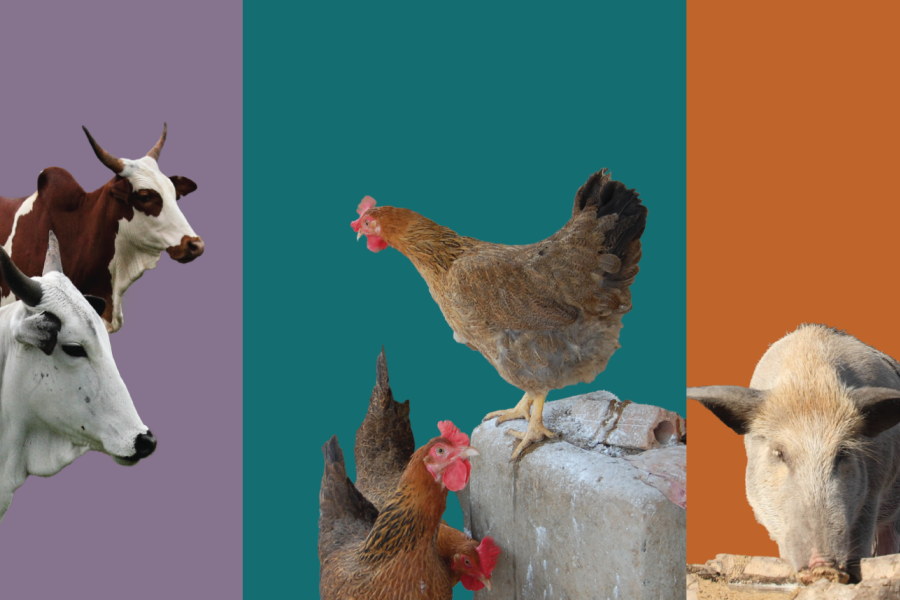Report back on Climate Finance for Livestock Development webinar

Discussion surfaces evidence and insights on the significant imbalance in climate finance allocation to the livestock sector
On 30 October 2024, experts from across the livestock and finance sectors gathered to tackle one of sustainable agriculture's most pressing challenges: unlocking climate finance for livestock development in low and middle-income countries (LMICs). The webinar, featuring insights from the Livestock Data for Decisions (LD4D) Climate Finance & Livestock Solutions Group as well as experts from the finance world, brought together technical advisors, policymakers, and finance experts to address the significant imbalance in climate finance allocation to the livestock sector.
Watch the event recording
The challenge at hand
The livestock sector presents a complex challenge: while supporting over 1.3 billion people globally, it contributes up to 20% of human-induced greenhouse gas emissions. Despite this significant impact, the sector receives disproportionately low climate finance support, particularly in LMICs where it's most needed.
Evidence and insights from LD4D Solutions Group
The first session featured experts from the LD4D Solutions Group on Climate Finance presenting new evidence briefs and case studies. Andrew Bisson (USAID) discussed the barriers and opportunities for building compelling investment cases for livestock initiatives, while Danielle Niedermaier (Land O'Lakes Venture37) and Gareth Salmon (SEBI-Livestock) presented advanced methods for emissions quantification. Laura Cramer (ILRI) outlined strategies for developing effective national policies, followed by real-world examples from Ethiopia and Urugay, and Kenya – presented by Sintayehu Alemayehu (Alliance Bioversity-CIAT), Ricardo Gonzalez Quintero (Alliance Bioversity-CIAT), Laura Cramer and Bernard Kimoro (Government of Kenya).
Discover the evidence briefs
Insights from the panel
A panel discussion brought together diverse perspectives from investors, policymakers, and thought leaders.
Climate Policy Initiative's Harsha Vishnumolakala opened with sobering findings from their latest research, revealing that sustainable livestock initiatives receive a mere 0.1% of tracked climate finance. He noted that current investments heavily favour technological solutions over nature-based approaches, despite the latter's broader environmental benefits.
Brazil's experience, presented by Bruno Brasil, offered an encouraging example of what's possible with the right policy framework. The country's ABC and ABC+ plans (PDF) have demonstrated remarkable success, expanding sustainable farming practices across 54 million hectares and achieving significant emissions reductions. Their approach combines scientific innovation with accessible financing through low-interest credit lines.
Leonardo Gava from the Climate Bonds Initiative addressed the crucial challenge of attracting private investment, emphasizing the need for robust standards to combat greenwashing concerns. He outlined how blended finance and clear sustainability metrics can help bridge the confidence gap for investors.
The IFC's Anup Jagwani shared concrete examples of successful investments, with over $1 billion committed to the livestock sector. His examples from Uganda and Ethiopia demonstrated how well-designed projects can simultaneously boost farmer incomes and reduce emissions, showing that environmental and economic benefits can go hand in hand when projects are properly structured.
Wrapping up the session, moderator Claudia Melim-McLeod (Future Horizons Intstitute) brought attention to the often-overlooked gender dimension of climate finance, prompting a valuable discussion about mechanisms to ensure climate finance supports women's empowerment in the livestock sector.
What is blocking climate finance for livestock development?
Technical Challenges
During the discussion, participants highlighted several key technical barriers that are blocking climate finance :
The absence of quantified GHG reduction targets in national climate commitments
Limited data and analysis of livestock sector loan performance
Significant challenges in identification and traceability, particularly in Sub-Saharan Africa
Inadequate monitoring and reporting systems for GHG emissions
Policy hurdles
The need to shift from simplistic livestock reduction narratives to more sustainable approaches
Limited involvement of smallholders in policy development
Poor integration between livestock development and climate change policies
Insufficient support for closing productivity gaps in smallholder systems
Looking forward: solutions and opportunities
The ideas generated during the discussions highlighted several pathways forward, including:
Development of better methods for emissions quantification
Strategies for creating effective national policies
Real-world examples of successful climate finance applications
Innovative approaches to building compelling investment cases
Next steps
With global food demand projected to increase by 30% globally (and up to 100% in some LMICs) by 2050, the urgency to address these challenges has never been greater. The event demonstrated that while the challenges are significant, there are clear pathways forward through improved technical capacity, policy integration, and strategic finance allocation
The rich discussion across both panels highlighted that success will require a balanced approach that considers both environmental impact and the crucial role livestock plays in supporting livelihoods, particularly in LMIC countries. Moving forward, the focus must be on implementing solutions that support both sustainable development and climate resilience in the livestock sector.
Looking ahead, the LD4D Solutions Group will continue to collaborate and identify opportunities to engage with climate finance institutions. Ongoing dialogue will be essential in identifying and addressing the barriers currently limiting investment in livestock systems. We will also draw on the valuable insights shared during this event to shape our next steps and refine our approach.
Want more? We invite all of you to join us at our upcoming annual meeting on December 5th, where we will continue this discussion. Registration is now open!


